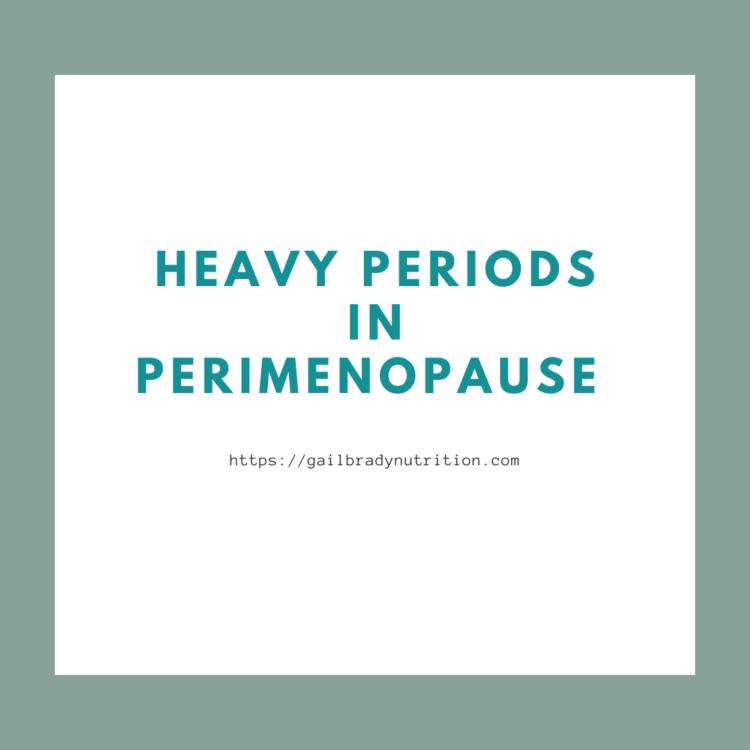Heavier periods that last for longer are common in perimenopause.
In fact, they may even be one of the first signs and symptoms that give you a clue about your changing hormone status.
You may also experience pain or cramping… but this shouldn’t be something that affects your daily life too much, or that lasts for more than a couple of days and cannot be relieved by taking ibuprofen.
How to manage heavy menstrual bleeding due to perimenopause
If ovulation isn’t taking place every cycle (this is common in perimenopause), the lining of your womb can thicken and take longer to shed.
If you are experiencing chronic stress or are over or underweight, you may produce more inflammatory prostaglandins. This can lead cause inflammation and pain
7 Tips for managing heavy periods
✅ Balance your blood sugar – Elevations in blood glucose lead to an increase in the production of insulin.
High levels of insulin can impair ovulation and the production of progesterone, leading to heavier periods
It can also increase the thickness of the lining of your womb which results in heavier bleeding
✅ Look after your gut health – Eating enough fibre and foods which help the beneficial bacteria in your gut to thrive
A healthy gut environment can help to excrete old oestrogen out of the body
Gut health testing can help to identify any potential issues
✅ Eliminate cow’s milk dairy produce – This may help to reduce inflammation and reduce heavy periods
✅ Lower your caffeine and alcohol intake – SORRY 😞 but caffeine and alcohol can lower progesterone levels when it is already decreasing due to perimenopause
Drinking alcohol may also impair your liver’s ability to process oestrogens
✅ Exercise – Exercise can help to balance blood sugar and insulin control
✅ Ibuprofen – may help to reduce bleeding by blocking compounds produced in the body called prostaglandins which can cause inflammation and pain
Ibuprofen may reduce blood loss by 20-40%. But just a reminder not to take ibuprofen on an empty stomach or use it long-term, as it can cause damage to the stomach lining. And always follow the dosage on the packaging
Some research has shown turmeric (curcumin) supplements may be an effective alternative to ibuprofen. However, you will need to check that these do not interfere with any other medications that you may be taking
✅ Get your iron levels checked – ironically iron deficiency can lead to heavier periods. It may be necessary to take a good-quality iron supplement
Other supplements may be recommended by a nutritionist or healthcare professional.
If heavy bleeding lasts for longer than 7 days there may be another issue.
The scientific name for this type of heavy period is menorrhagia.
The NICE guidelines define menorrhagia as ‘excessive menstrual blood loss’ of 80 ml during one cycle.
This often means changing pads or tampons (or using both at the same time) every couple of hours
To put this into context, this would be the equivalent of 16 fully soaked regular tampons or 8 super tampons.
Flooding (changing menstrual products every 30-60 minutes) and blood clots of over 2.5 cm may also be experienced.
Menorrhagia is often accompanied by pain that cannot be relieved by over-the-counter painkillers.
If this is happening to you, it is likely that it could be affecting your quality of life as well as potentially leading to iron deficiency anaemia.
This type of anaemia can cause hair loss, fatigue and shortness of breath.
If you can relate to these symptoms, this could be a sign that something is not quite right and you should consult your GP for medical advice.
Causes of Menorrhagia
In around 50% of women, the exact causes are not understood, however, in the remaining 50% causes can include; uterine fibroids, adenomyosis and endometriosis, endometrial polyps, pelvic infection or pelvic inflammatory disease, polycystic ovary syndrome (PCOS), suboptimal thyroid function and coagulation disorders.




